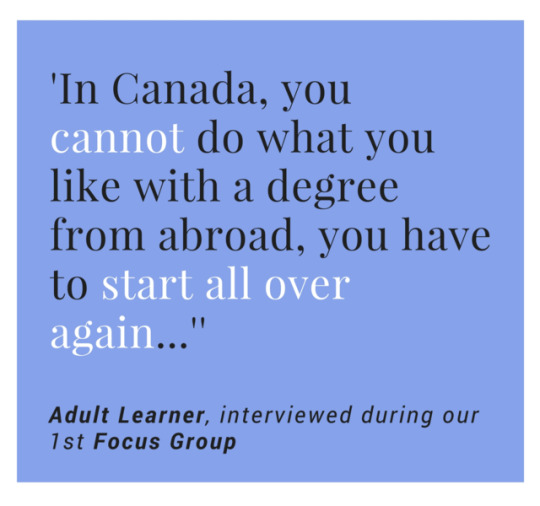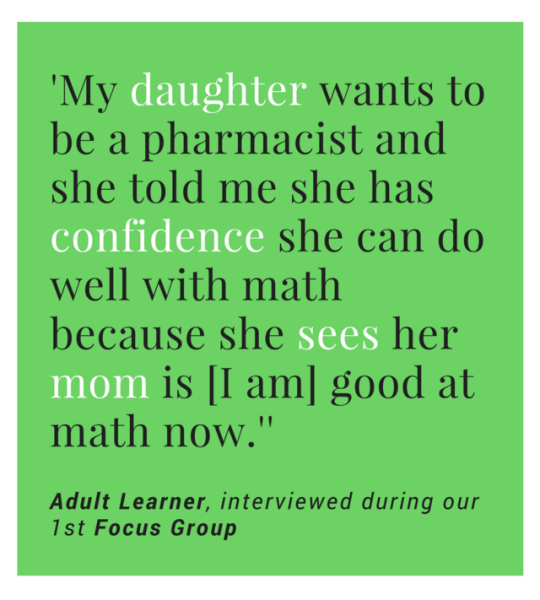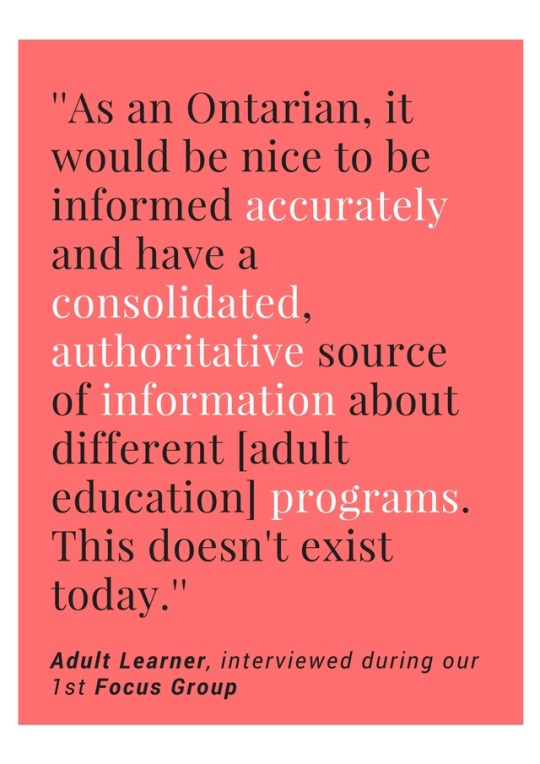A view into the lives of 3 Code for Canada fellows as they work within the Government of Ontario to build digital solutions that help improve the lives of Ontario's residents.
Don't wanna be here? Send us removal request.
Photo

Made it to Thunder Bay for user interviews and testing!
2 notes
·
View notes
Text
1st FOCUS GROUP WITH LEANERS
On Thursday, December the 14th we facilitated two 90-minute Focus Group sessions with a total of 17 Adult Learners from different colleges currently enrolled in the Literacy and Basic Skills and Academic Upgrading programs. Three MAESD staff members agreed to join us as facilitators, which is awesome because it marked one of the first times they met and talked with learners!
Each Focus Group session had two parts: A. First we conducted small interviews (1-on-1, 2-on-1, depending on how many learners showed up to each session). For this, we designed a set of questions about the current experience of learners that we used for guidance, but we wanted the experience to be as natural as possible, so we approached it as we would a conversation. We used this Jobs to be Done interview template to capture the journeys of learners. B. And then we coordinated a group activity in which learners were asked to provide input on their ideal future experience in adult education. We gathered lots of useful info and we’ll be sharing some quotes here from adult learners! In the meantime, here’s a photo of a journey map draft with suggestions for improvements made by learners.
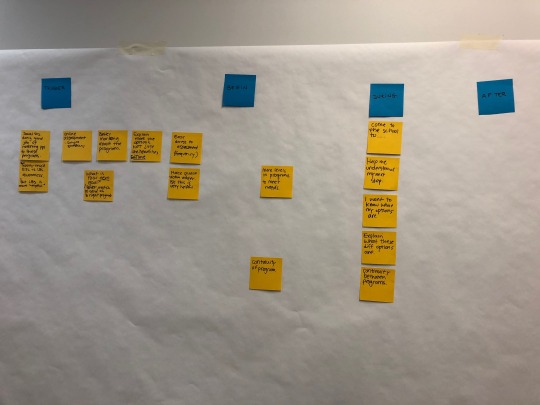
0 notes
Text
FIELD TRIP #2
On the first week of December, Sophie and Santiago visited a community centre that offers English as a Second Language classes. We selected a location, found out about the class hours online, and then hung out in the area a few times during the week looking for an opportunity to talk to learners. We tried right before the start and right after the end of classes (with little success), but then we lucked out and happened to have one friendly student invite us into a classroom to interview several students who were eating lunch inside during a break. Thank you kind stranger!

We interviewed a total of 12 students of different English-proficiency levels. This is what we learned: 1. Most learners (75%) indicated their path towards discovery and arriving at their ESL program was: Contacting an immigration services agency, this agency referring them to the YMCA, the YMCA assessing their English level with a test and providing them with a list of service providers that offered classes that matched their level. 2. Some learners (25%) expressed that classes were not good enough for them because groups were made up of people with different English language proficiency levels. 3. Some learners (17%) had previously completed the Federal Language Instruction for Newcomers program.
0 notes
Link
If you are curious to see how we filled the 3 hours of the Kickoff, here’s the complete workshop presentation, .gifs and all. Enjoy!
0 notes
Text
PROJECT KICKOFF
On Thursday, November the 23rd we held a 3-hour Kickoff meeting with participants from the Partner Ministries (Ministry of Advanced Education and Skills Development, Ministry of Education, the Ministry of Citizenship and Immigration, Ontario Digital Services, and the Community and Services Cluster), including directors, managers, and staff members!
One first goal for the meeting was to introduce ourselves as Code For Canada Fellows and meet with internal staff from different ministries we will be engaging with for the duration of the project, as well as explaining our approach: deliver early, test often, and work in the open.
Our second goal for the meeting was to enable cross-ministry conversation and collaboration. We designed three ministry-agnostic adult learning situations, and we coordinated a group activity in which we asked participants to divide into groups and put themselves in the shoes of adult learners by developing a journey map and identifying pain points for one of these situations.

2 notes
·
View notes
Text
A BRIEF INTRO TO ADULT EDUCATION IN ONTARIO: PART 3
Time to throw in some quotes we’ve come across related to adult learning in Ontario.
Almost 700,000 Ontarians between the ages of 25 and 64 are without a high school diploma.
Each year almost 200,000 Ontarians participate in adult education programs.
Adult learners have diverse personal needs and learning pressures. In many instances, their “re-entry into the learning environment [...] requires a profound leap of courage, and yet their learning success is integral to the health of our communities and our economy” (Letter from the Parliamentary Assistant to the Minister of Education).

1 note
·
View note
Text
A BRIEF INTRO TO ADULT EDUCATION IN ONTARIO: PART 2
This graphic is what we refer to as “The Pie”. It shows all current adult education programs in Ontario that are funded by one of the three Partner Ministries (Ministry of Adult Education and Skills Development, Ministry of Education, and Ministry of Citizenship and Immigration), and the type of service providers that deliver each program (community organizations, school boards, and colleges).

However, things are not as clear-cut as they seem to be. We have already discovered that there is some duplication/overlap among programs. For instance, we were told that Academic Upgrading is a rebranding of Literacy and Basic Skills. And we also found out that Ontarians have access to English as a Second Language programs that are part of the Language Training programs mentioned above, as well as Federal ESL programs which are branded in a different way, such as Language Instruction for Newcomers, Language Training for the Workplace, and Language Training in the Workplace. Confusing, right? Which makes us wonder... If we (fellows) are having trouble wrapping our heads around this, imagine how difficult and confusing this could be to someone who is not proficient in English or has other general comprehension challenges.
With this overwhelming choice and lack of clarity in program differences - How do adult learners/prospective adult learners know which program is the best fit for their needs?
1 note
·
View note
Text
FIELD TRIP #1
Before jumping into internal meetings, documents and decks we first wanted to get a taste of what it would feel like to be in the shoes of the adult learner - And what better way to learn about the challenges adult learners face in Ontario than to go where they are and experience, for ourselves, the environment and interactions they face when trying to look for an adult education solution.

So, on Monday, November the 20th each Fellow thought of a scenario that felt close to home and reflected challenges we ourselves or family/friends currently face or faced as newcomers in Canada, and went to two different service providers in Toronto that offer adult learning programs.
What did we learn? 1. The experience can be intimidating. We felt we were at the mercy of the first person we encountered. If you’re lucky, you will meet someone helpful who will propel you forward; if you’re not, and you meet with someone rather dismissive or cold, that could very much discourage you and that might be the end of your adult learning experience.
2. The experience can also feel rushed, depending on the service provider. Sophie, for instance, was asked to take an assessment test, and then was promptly enrolled in a program without having anyone take the time to understand what her goals were. Similarly, Christine was just simply given a pamphlet with a number to call.
3. There appear to be conflicting interests when it comes to some service providers. Santiago, for instance, was given several options and paths to work on the goals he presented, which is great, but was then advised not to go to service providers owned by a certain district school board. This makes us think that there might be some level of competition among them.
0 notes
Text
A BRIEF INTRO TO ADULT EDUCATION IN ONTARIO: PART 1
The Partner Ministries
Three ministries are in charge of managing adult education programs: 1. Ministry of Advanced Education and Skills Development (MAESD) 2. Ministry of Education (EDU) 3. Ministry of Citizenship and Immigration (MCI)
In September 2016, these three ministries were mandated to work together to strengthen the adult education system. Which means that, even though we’re working within MAESD, we’ll also be constantly in touch with people from both EDU and MCI. From what we’ve observed, different units and branches within a single ministry are not always accustomed to communicating openly and transparently, so encouraging and fostering multi-ministry communication will be a challenge of its own. Time to try and break down some silos!

0 notes
Text
OUR APPROACH
1. Deliver early 2. Test often 3. Work in the open

0 notes
Text
Hello! Bonjour!
Welcome to our Code for Canada: Ontario Team blog!
There is such an amazing civic-tech community in Canada and across the world and we’re excited to contribute and participate as part of the inaugural Code for Canada fellowship!
Throughout our fellowship term we’ll be sharing our thoughts, learnings, and other interesting moments on this blog.
So, who’s on the team?
There are 3 of us on the Ontario team: Christine Lee (Product Manager), Santiago Mendoza (Developer), and Sophie Sengmany (UX Designer).
(...am realizing we don’t have a proper team pic yet. In the mean time, here’s an elevator selfie!)
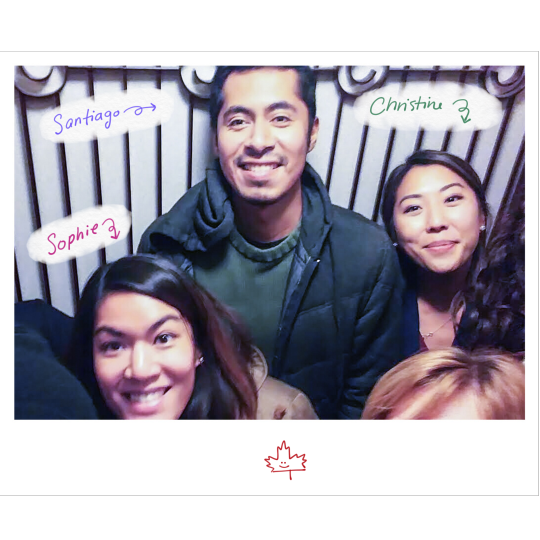
What are we working on?
We’re excited to be working with Ontario’s Ministry of Advanced Education and Skills Development to build solutions that improve the adult education experience.
Stay tuned for more to come!
1 note
·
View note


